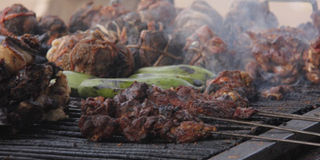Goat meat ranks high

To say that Ugandans love nyama choma is under statement. Three years since Uganda was declared the highest pork consuming country in Africa, the craving for pork meat is yet to tone down. Now a new trend is building up – the love for goat meat.
Prepared in all forms; roasted or boiled, consumers take them in equal measure.
According to Moses Kigato, who roasts goat meat at Kitetika goat’s meat in Gayaza, Wakiso District, consumption of goat meat is on the increase.
“In my view, what makes goat meat special and different is that every part of the animal is consumed ranging from the offals, head, hooves and the meat,” he said.
Kigato says there are several reasons why seemingly goat meat is Uganda’s most preferred.
“Goats are very clean animals. Most livestock farmers prefer the goats because they are easy to rear,” says Kigato.
The numbers
Available statistics indicate 1.1 million households keep goats and 3.5 million smallholder farmers directly depend on rearing goats, while millions others are employed in the value chain. 98.7 per cent of goats in Uganda are indigenous whereas 1.3 per cent are exotic (Boer 79.1 per cent and Galla 3.7 per cent).
Total goat population in Uganda is estimated at 13 million. This enterprise is lucrative for farmers to venture into especially in the city. Johnson Arinaitwe a livestock farmer in Galilaaya, Kayunga District says he supplies 20 goats per month to Kitetika goat roasting joint. “I sell each goat at Shs300,000. On average I earn Shs6m per month,” says Arinaitwe.
According to Dr Ben Lukuyu, an animal nutritionist, while the goats sub-sector is growing by leaps and bounds, it is facing a number of challenges like high cost of feeds, poor quality and quantity of feeds.
Varying trends in city centre
Few goat eaters have not visited Friends Goat’s Butchery at Kitetika and tasted the delicacy prepared by several roasters led by Paddy Twesigye. On average the group sells 150 goats a day to their clientele – mostly corporates, locals and travelers.
Each skewer at Twesigye’s goes for Shs4,000 while a platter of ribs costs Shs20,000 each. Twesigye buys goats from several farmers in Wakiso with each goat costing between Shs350,000 and Shs400,000.
“On a good day we sell more 150 goats especially on Saturday and Sunday,” said Twesigye.
Edith Namutosi, who operates goat meat joint in Mukono says on average she sells 10 goats every day.
A kilogramme at Namutosi’s butcher costs Shs22,000. She buys goats from Wakiso, Mukono and Lugazi. Soybean Kabarasi, the in-charge at Vai King Bar in Bunga, sells a fried kilogramme at Shs20,000 with cassava and avocado as ‘escorts’.
In Mityana, and large parts of Mubende, a trader can buy a goat starting with a low fee of Shs250,000 to Shs300,000. In Bugoloobi at both choma zone and the base, goat meat is grilled over an open charcoal fire and boiled.
The grilled meat is served with greens and a combination of boiled cassava, steam matooke and roasted bananas while the boiled meat is served with sukumawiki greens and posho. A platter at choma zone costs Shs25,000.
Benefits of eating goat meat
Goat meat is high in protein and rich in many vitamins and minerals, lean goat meat can be an excellent addition to a healthy diet. Goat meat is a high-protein food and contains varying amounts of fat.
It contains all the essential amino acids necessary for the growth and maintenance of our bodies.
In fact, goat meat is one of the most complete dietary sources of protein.
For this reason, eating goat meat, or other meats, may be of particular benefit for bodybuilders, recovering athletes, post-surgical patients, or other people who need to build up or repair their muscles.
High demand for goats
The goat meat industry is growing in Uganda. Their meat fetches the highest prices daily on the butcheries and during the festive seasons, mainly Easter and Christmas, when customers are willing to pay premium prices for quality meat.
By combining goats with cattle in the pastures, a farmer can get a slice of this growing market.
Paddy Twesigye one of the leading buyers of goats says the key can only be the limit.
He says Kenyans, Congolese, Rwandese and Sudanese are flooding the market. “Our goats are on high demand in South Sudan. Every week we export more than 100 goats to Sudan,” he says.
Goat prices
Farmers are advised to sell their goats at butcheries in the city and major towns.
Pastor Simon Mukiibi says the price ranges from Shs200,000 to Shs300,000.
“The best goats are supplied by Ssembabule, Kiboga and Mbarara districts. Every day we pay good money to farmers who bring in there goats,” says Mukiibi.
Edward Karekeezi is the biggest supplier of goats to Kitetika butcheries. Karekeezi’s farm is situated in Ssembabule. He has more than 30,000 goats.




